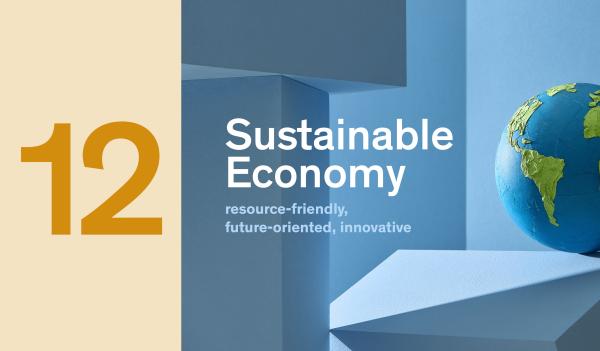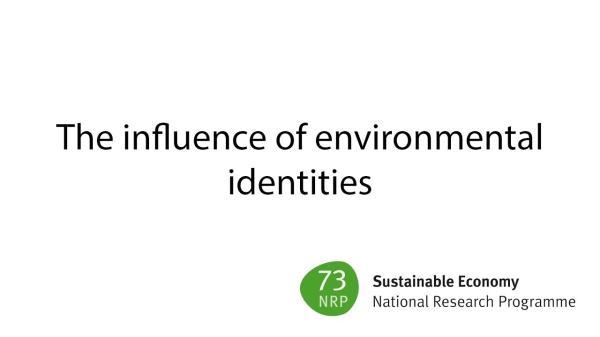The influence of environmental identities
People have a complex relationship with the natural environment, and two key factors influence their behaviour in terms of sustainability: the extent to which they relate to the natural environment, and whether they think of this relationship across various decisions. We show that the latter is more important than the former, leading to important consequences for research in environmental psychology and practice aiming to foster sustainable consumption.

Background
How can we encourage voluntary sustainable behaviour? This question is at the heart of current pro-environmental research and policymaking. Regulated behaviours are subject to change due to legal frameworks and political commitment and, as such, may not ensure genuine citizen engagement in the long run. Our research looks at a key mechanism underlying voluntary behaviours—the role of identity motivation, leading to the expression of who people are through their actions. Environmental identity is a concept that is responsible for much of identity-based sustainable behaviour, but its specific workings are not yet well understood.
Aim
We look at the role of environmental identity – a person’s sense of connection to the natural environment – in individual sustainable behaviour. We highlight the complexity of the environmental identity construct and then study its various components, including identity strength (to what extent a person relates to the natural environment) and identity salience (to what extent a person thinks of their relationship to the natural environment in a decision context). We investigate which of these identity components is more predictive of individual behaviours in various decision situations.
Results
Environmental identities and associated attributes
Environmental identity refers to the personal connection an individual has developed with the natural environment. In the past 20 years, considerable attention has been devoted to the concept and its measurement, yet its relationship with other psychological concepts has not been comprehensively investigated. Across the surveys we have conducted, it appears that individual citizens have complex views of, and relationships with, nature. Results show that their environmental identity is stronger if:
- their personal values are characterised by lower materialism, and more moral and green values;
- their personality is characterised by more self-respect, more agreeableness, and more openness to experience;
- their views of nature are more positive and more powerful;
- they report stronger engagement in pro-social and ecological behaviour and less interest in status consumption;
- and, in terms of socio-demographics, if they live in rural rather than urban areas.
The effects of identity salience and strength on sustainable behaviour
Employing surveys and experiments, we set out to study the effect of environmental identity on sustainable behaviour by investigating the effect of two specific identity components: environmental identity salience and environmental identity strength. We developed novel measures and manipulations of environmental identity salience and improvements to existing measures of environmental identity strength. It appears that, in most of our studies, either relying on self-reported behaviours or observing actual behaviours, environmental identity salience had a consistently stronger predictive effect on a wide range of behaviours than identity strength. It is also likely that these two identity constructs might exert some independent effects on sustainable behaviour. Because of this, interventions based on environmental identity salience can touch broad consumer populations. In concrete terms: whether a citizen is a strongly pro-environmental person or not, reminding them of their connection to nature will likely influence their sustainable behaviour in a range of specific decision situations.
Further research and collaborations
On the basis of these results, we are participating in the NRP 73’s Co-Creation Lab “Sustainable Behaviour and Consumption”. Together with two other teams, we have set up the Swiss Sustainable Consumption Observatory as a regular nationally representative survey of consumer identities, attitudes and pro-environmental behaviour. Our first results confirm the findings of our NRP 73 project, validate its main conclusions, and point to new research directions – in particular with respect to the types of behaviours, as well as other identities, that may be relevant to citizens’ pro-environmental engagement. We will investigate some of these issues in a follow-up SNSF project in 2023-2026 (No. 100013_212337) and in an Implementation Network proposal with academic and non-academic partners.
Implication for research
Our findings highlight the importance of shifting research attention from environmental identity strength to identity salience. More information is needed on the types of decision situations and behaviours that are most conducive to the emergence of salience effects, and how to maximise those effects to enable high-impact behaviours. Future research should also focus on the structural relationships between the different types of identities that shape a person’s sustainable actions.
Implication for practice
Our research suggests that applied interventions can appeal to citizens’ identity motivations to induce engagement in sustainable behaviours in domains such as shopping, product consumption and voting. It offers a series of easy-to-implement tools for practitioners who wish to measure, or influence, aspects of citizens’ environmental identity and sustainable individual behaviour. We also provide guidance on how to design targeted, identity-based messages to promote sustainable individual behaviours.
Publications
Project leaders
Prof. Dr. Sandor Czellar
Département de Marketing
Faculté des HEC, Université
Project partners
Ville de Morges




